#this whole interview is literally an assassins fan's dream it's everything to me
Explore tagged Tumblr posts
Text
watching the sondheim + weidman assassins interview and hello!!! two whole photos of the unworthy of your love scene from the original production that i haven't seen anywhere else before!!


#bee posts nonsense#assassins musical#theatre#this whole interview is literally an assassins fan's dream it's everything to me#the set designer is also interviewed and shows models of the original sets and he even talks about the costuming a bit.....#fuckk it's just so cool to hear all the thoughts behind all the little details of the show
19 notes
·
View notes
Text
Tropes of Toxic Masculinity in the Male “Heroes” of Buffy the Vampire Slayer
“It's terribly simple. The good guys are always stalwart and true. The bad guys are easily distinguished by their pointy horns or black hats, and, uh, we always defeat them and save the day.” Rupert Giles says this faciously to his charge, Buffy Summers, at her request for him to lie to her about how easy her life as a slayer will one day come to be, in the seventh episode of the second season of Buffy the Vampire Slayer fittingly titled “Lie to Me.” The term “guys” in this context, by the time the episode was written and premiered in 1997, was meant and understood to be gender neutral, but put into the larger context of the series as a whole could easily be limited to “guys” in the traditional, masculine sense. In Buffy, it is men’s actions that are most often morally ambiguous, with few exceptions. Even more, it is the men who fight beside Buffy in the battle against evil whose actions hurt her the worst, Giles included. Each of the male “heroes” in Buffy the Vampire Slayer illustrate the different shades and extremes of toxic masculinity by exemplifying an inherently flawed trope. Each of them, in accordance with their corresponding trope, take choices away from Buffy and cause lasting psychological damage with ranging degrees of acknowledgement from both her and/or the narrative. In this paper, I am going to scrutinize the three who were introduced early on and stayed through to fight the final battle alongside Buffy: Giles, Spike, and Xander.
Let’s start with the character that has been previously mentioned, Rupert Giles, typically referred to by both characters and fans alike simply as “Giles.” Giles is introduced in the pilot episode, titled “Welcome to the Hellmouth,” as a “Watcher” for Buffy (see figure 1). He has been assigned to her by the Watcher’s Council, an age-old organization dedicated to the elimination of vampires and demons from the Earth, to prepare and assist her in the fight against evil-essentially being the brains to her brawn. As the series goes on, however, Giles’ role in Buffy’s life transitions from that of detached supervisor and is built up to fulfill that of the Father Figure trope. Buffy’s own father is divorced from her mother and is never seen again in a non-dream sequence after his second-time appearance in the premiere episode of the second season. The creator of the series, Joss Whedon, admitted in an interview with the New York Times that this phase out had a relevant purpose: “It’s true that Buffy’s father started out as just a divorced dad and then turned into this sort of "evil pariah" figure of not even bothering to show up, and that was simply because we had a father figure in Giles…”
Giles’ attachment to Buffy as a surrogate child rather than simply as his trainee arguably first gets shown to the viewer in the season 1 finale entitled “Prophecy Girl.” Giles has come across a prophecy that predicts her death at the hands of the current Big Bad, the Master, and Buffy overhears him telling her love interest Angel about it so that they may form a plan without her. “Read me the signs! Tell me my fortune!” she yells, throwing his books at him (see figure 2). Buffy’s knowledge of her destiny since the pilot has been filtered through Giles, who struggles to serve his dual roles of both Watcher and father figure. In his role as the latter, he withholds information from her that he learned in his service to her as the former, and acts on his own instead in order to protect her. This will be the crux of their relationship throughout the series, and feminist scholar Gwyneth Bodger feels it is emblematic of a larger issue,
Indeed, he acts as a substitute father for Buffy, and it is here I would argue that the series departs from a feminist ideology. As a powerful figure in the series, Buffy has the potential to become the figure of the unruly or disorderly woman. In order to prevent this, she must be "owned"; her power must be channeled and controlled by a man, in this case, a father figure..
Fast forward to season three, and Giles’ role as father figure becomes explicitly textual in two episodes in particular: episode six, “Band Candy,” and episode twelve, “Helpless.” In “Band Candy”, Buffy returns home from visiting Angel to find Giles and her mother, Joyce, angry that she lied to them both that she would be with the other, rather than Angel. The mise-en-scené clearly indicates that Giles and Joyce are a united front in the way any functioning pair of parents would be (see figure 3). Later, in the same episode, having been placed under the influence of magical chocolate bars that revert them back to their teenage personalities, the two sleep together. In doing so, Giles-if only temporarily; this is the only time that he and Joyce sleep together-officially takes over all “fatherly” duties in the Summers household. Buffy is disgusted when she finds out they had sex, but only to the extent any teenager would be to discover their parents’ sex life.
In “Helpless,” just as Buffy’s birth father betrays her by missing her birthday, Giles betrays her by removing her powers for a Watcher’s Council ordered test that has historically been conducted if a slayer reaches her eighteenth birthday. Even more devastatingly, he does so right after Buffy asks him if he would like to take her father’s place in their now broken birthday tradition. He soon comes to his senses when Buffy is nearly killed by the vampire who escaped the Council’s control, but it’s far from enough to immediately salvage their relationship. “You poisoned me!” she cries, wrenching her arm from his pleading grasp, “I don’t even know you.” It is only when he arrives to help Buffy save her mother from the same vampire as earlier, and the head Watcher points out what makes Buffy and Giles’ relationship unique - “Your affection for your charge has rendered you incapable of clear and impartial judgment. You have a father's love for the child, and that is useless to the cause.” - that fences are mended, symbolically shown by Buffy allowing Giles to help clean her wounds (see figure 4). His role as father figure has been reinstated, as well as reinforced. In the same swoop, Giles is kicked out of the patriarchal Watcher’s Council, which as Buffy scholar Ian Martin puts forth in his video guide for the episode, “is symbolic of him no longer being a contributing member of the patriarchy. He disobeyed a direct order. He broke with tradition.” However, it is Martin’s next words that are haunting: “While they have appeared to have reconciled by the end of the episode, Giles’ betrayal represents a sobering loss of innocence here for Buffy, tied to her actual father ditching her at the beginning of the episode.”
The next two seasons primarily serves to build their relationship further, but are not without their caveats. In the ninth episode of season four, while Buffy is under a spell that compels her to be engaged with her tenuous ally Spike, she asks Giles if he would walk her down the aisle. Initially Giles is touched by her request, but after a moment snaps back into the reality of the situation and dismisses it, hurting Buffy in the process. In the sixteenth episode of season five, when Joyce dies from an aneurysm, it’s Giles that Buffy leans on for support. In the eighteenth episode, Buffy tells Giles “I love you,” for the first time. However, by the next episode, Giles becomes concerned that Buffy is coming to depend on him too much, to her own detriment, and begins to withdraw. Yet, if Giles were to listen to and respect what Buffy was saying, he would realize that’s not what she needed. Joyce’s passing heaped even more responsibility on her shoulders-raising her little sister Dawn and maintaining a house-so what she needed was someone to share the responsibility she was drowning under with someone she trusted and looked up to. Someone like a father figure.
This dilemma would be picked up mid-season six, after Buffy’s friends had wrenched her out of heaven and back to a “loud and violent” life. In an episode filled with stylistic exhibitionism, “Once More with Feeling,” Giles sings a song that betrays his feelings on the matter: “I wish I could say the right words to lead you through this land, Wish I could play the father and take you by the hand, Wish I could stay, But now I understand, I'm standing in the way.” At the end of the following episode, he departs to England for the rest of the season, leaving Buffy to fight her growing depression and duties alone.
Giles returns at the end of season six and mostly remains for the rest of the series, but enacts one last, glaring betrayal. In the seventeenth episode of season seven, appropriately entitled “Lies My Parents Told Me,” he distracts Buffy while elsewhere one of their new allies attempts to kill Spike, who since “Something Blue” Buffy has grown to trust and have complicated feelings for. It’s the equivalent of a shotgun-toting father facing off against their daughter’s new boyfriend, only Giles would have gone through with it. Giles also has a rather misogynistic outlook on Buffy’s motivations, believing that Buffy’s protection of Spike must be driven by her emotions despite her logical insistence that after her Spike is the best warrior they have on their side. Buffy realizes what Giles is doing, the assassination attempt fails, and Buffy literally shuts the door on Giles in her life as a father figure as she says, “I think you’ve taught me everything I need to know” (see figure 5). Buffy no longer wants or needs Giles to lie to her, regardless of the place of fatherly love those lies stem from.
Spike, of course, is far from innocent either. For the sake of brevity-Spike has more academia written about him than any other character in the series minus Buffy herself- I will be focusing on Spike’s place in the fifth and sixth seasons in which he fulfills the trope of “The Suitor.” The fifth season is when Spike really becomes a part of Buffy’s team and starts to get close enough to her that he can hurt her emotionally, when previously all they were presented as feeling for each other was animosity. He realizes that he’s in love with her at the end of the fourth episode of that season, and so his role as The Suitor begins.
Spike, formerly known to human society as William Pratt, was turned into a vampire in Victorian England in 1880 at 27 years old. The ways in which Spike goes about trying to earn Buffy’s affections throughout season five parallel a twisted version of the courtly love sensibilities that would have been popular when he was turned, even if the term itself had not yet been coined. In her scholarly article, “‘Ain’t Love Grand?’ Spike and Courtly Love,” Victoria Spah outlines and describes exactly what this means:
The term "Courtly Love" is used to describe a certain kind of relationship common in romantic medieval literature. The knight/lover finds himself desperately and piteously enamored of a divinely beautiful but unobtainable [sic] woman. After a period of distressed introspection, he offers himself as her faithful servant and goes forth to perform brave deeds in her honor. His desire to impress her and to be found worthy of her gradually transforms and ennobles him; his sufferings—inner turmoil, doubts as to the lady's care of him, as well as physical travails—ultimately lends him wisdom, patience, and virtue and his acts themselves worldly renown… Like any intricate allusion, references to the various pertinent aspects of the mythos (which itself has no definitive version) are woven subtly throughout without heavy-handed complete correspondence. Spike and Buffy are after all modern characters and as such must retain the psychological depth lacking in medieval stock characters, and thus their story is not informed solely by the Courtly Love tradition. The correspondence, ironic and teasing at times, straight-forward at others, is however quite fascinating and worth further examination.
The first stage of courtly love is, “Attraction to the lady, usually via eyes/glance.” The actor who played Spike, James Marsters, has stated in multiple interviews over the years that, “As an actor, I right away played an attraction to Buffy.” In his first episode, “School Hard,” Spike stalks Buffy, watching her dance at the Bronze and then having her fights secretly videotaped so that he can study her moves (see figure 6). Even these early scenes have, as Marsters himself admits, “a heavy sexual undercurrent.” The watching of the videotapes in particular is inherently voyeuristic, and presents a modern take on how “glance” and gaze has changed since the middle ages.
Getting back to the focus on season five, the second stage is, “Worship of the lady from afar.” After Spike realizes he’s in love with Buffy, it quickly turns into an obsession. He lingers outside Buffy’s house, chain smoking cigarettes and watching at her bedroom window. He sniffs her sweaters when she isn't home. He rehearses conversations with her on a look-a-like mannequin that rapidly turn violent when he anticipates her rejections. He even has a “Buffy shrine” dedicated to her, filled with pictures and sketches of her, her sweater that he stole after he sniffed it, a bloody gauze that was used to bandage a severe stab wound she recently got, and multiple of her stakes. Buffy is disgusted and horrified by this when she comes across it in the episode “Crush.” Her keen sense of violation is made clear when she punches Spike across the room and into the shrine, destroying it (see figure 7). It’s a beat that summarizes the worst of their relationship in these two seasons in a single snapshot: Spike sees Buffy as an object of worship that with enough prodding he can bring down to his level, but Buffy destroys that dream every time.
The episode “Crush” is a major one for their relationship, as it is when Spike reveals his feelings to her for the first time in accordance with the third stage, “Declaration of passionate devotion,” as well as the fourth stage, “Virtuous rejection by the lady.” Spike makes these declarations twice in this episode, but after Buffy rejects him the first time he makes the second one bigger, grander. He chains her up while she’s unconscious and makes an oath to either stake his sire/ex to prove his love for her, or let his ex kill her if she doesn’t admit to feeling something in return. He’s performing, putting on a show in anticipation of completion of the fourth stage. Even he knows that doing this is not the way to get Buffy to change her mind from her previous refusal. He’s taken it upon himself to move her from passive object of desire to active participant in the courtly ritual. It’s another example of him violating her agency and sense of self.
After this episode, Spike takes a turn for the better for the rest of the season. He does one last disgusting, literally objectifying thing-having a likeness of Buffy made in the form of a sex robot-but before the end of that same episode is willing to be tortured and killed before he would give up information that would lead to Dawn’s death. Spike proves with word and action multiple times before the season ends that he would be willing to die for Buffy, thus completing the fifth stage, “Renewed wooing with oaths of virtue and eternal featy.” For his trouble, Spike earns the knightly favor of exactly one kiss from Buffy before she dies in the season finale, arguably completing the sixth stage, “Heroic deeds of valor which win the lady’s heart.” However, it is worth noting that with that kiss, Spike’s redemption, or lack thereof, officially becomes yet another of Buffy’s responsibilities.
Spike’s role as “The Suitor” shifts in season six, after Buffy comes back from the dead. Courtly love has been completed, but not to any great satisfaction for him: Buffy still doesn’t love him. Per her depression, she doesn’t feel like she can love anyone, let alone a vampire without a soul regardless of his recent good deeds. Every sexual advancement that occurs between them stems from Buffy’s pain-of being torn out of heaven, of depression, of Giles leaving. Their sexual relationship for her is a form of self-harm. On Spike’s side, the first time they have sex is after they realize that Spike can hit her again, despite the government chip in his head that prevents him from hurting people. Courtly love is inherently aspirational, about being devoted to a woman who is unquestionably above you. When Spike’s ability to hit Buffy returns, Spike sees them returned to the equal playing field they had before he fell in love with her, and so turns into an abusive boyfriend kind of suitor rather than the virtuous knight he strived to be previously. Not only does he abuse her physically, but he also equips the classic abuse tactic of attempting to separate the victim from their loved ones, telling her that she belongs in the dark with him instead of dancing in the light with her friends (see figure 8). This all culminates in the nineteenth episode of season six, “Seeing Red,” in which Spike attempts the ultimate betrayal and taking away of a woman’s choice: trying to rape Buffy.
Spike goes to Buffy’s house after she’s put an end to their sexual relationship to try to get her back, while Buffy has been put through an ordeal that significantly weakens her. He forces himself on her despite her protests in the hopes of “getting her to feel it [love for him],” and then snaps out of it, disgusted with himself, when she manages to kick him off. As Buffy scholar Lani Diane Rich puts it in her video about the episode, “Spike is horrified by his own behavior and that’s good, he should be, but it doesn’t do anything to mitigate Buffy’s experience here...the shock and horror of that experience is something you carry with you always.”
Spike’s self-disgust leads him to a cave in Africa, where he endures a series of trials to earn, the viewer is led to believe, his greatest wish: the chip out of his head. In a moment of narrative spectacle in the season finale, however, the viewer is shocked to learn that it’s not the ability to hunt humans again that is Spike’s greatest wish (see figure 9). It’s getting his soul back, so he can, as he puts it, “give Buffy what she deserves.” In the established mythology of the series, the souled and unsouled versions of an individual are in many ways separate entities, with individual desires. Spike fighting for and earning his soul is akin to committing suicide so that a better version of him, a version more genuinely selfless and caring of Buffy’s needs, may rise from the ashes. The Suitor, both knightlike and abusive, is dead.
There’s a male character left in Buffy’s life who doesn’t face the consequences of his toxic actions the way Giles and Spike do: Xander Harris, the Best Friend. To be more specific, the “friendzoned” best friend, particularly in the first two seasons. When the viewer is introduced to Xander in the first episode in the series, it is immediately made apparent that he has a crush on Buffy, and equally made apparent she doesn’t reciprocate through her budding attraction to Angel. Yet, Xander continues to go forward with his feelings anyway. In S. Renee Dechert’s essay, “‘My Boyfriend’s in the Band!’ Buffy and the Rhetoric of Music,” Dechert describes a fantasy Xander has in the fourth episode,
As Xander dusts a troublesome vamp at the Bronze, an enraptured Buffy watches. After the fight, she exclaims, “You hurt your hand! Will you still be able to…?” “Finish my solo, and kiss you like you’ve never been kissed before?”... Then he jumps onstage and whips out a Hendrixesque guitar solo while an awed Buffy looks up at him. (The camera angle further empowers Xander here, shooting up at him as he stands above the crowd, the light outlining his phallic guitar and empowered-and fashionably dressed-body.) (see figure 10)
To Xander, the perfect fantasy is him being the empowered in their relationship in all masculine senses of the word-most relevantly, being the only man in Buffy’s eyes.
In the sixth episode, when he is possessed by the spirit of a hyena, his feelings are twisted into an animalistic form that prompts him to sexually assault Buffy. After the spirit has been removed from him, he pretends that he doesn’t remember his experiences while he was possessed, and Buffy never finds out he’s lying. In the first season finale, when he works up the courage to finally ask her out and she gently rebuffs him, he lashes out, “I guess a guy’s gotta be undead to make time with you,” but the narrative makes clear we are supposed to empathize and pity him for it, not resent him. In season two, in the episode “Surprise,” Xander details a whole revenge fantasy in which Buffy gets her heart broken by Angel, only to be saved by Xander. Again, it’s played off as a joke. Three episodes later, Xander uses magic to make his ex infatuated with him so he can reject and humiliate her, but it backfires by having all the women of Sunnydale, including Buffy, be infatuated with him instead. The narrative actually has Buffy earnestly thank Xander for having the “strength” and “self-control” not to rape her. Finally, in the season two finale, Xander is sent by the rest of the Scoobies to tell Buffy on her way to fight a now soulless Angel that Willow has discovered a way to restore Angel’s soul. Yet, he takes it upon himself to instead tell Buffy to “kick his ass,” giving Buffy no hope of any alternative to killing the man she loved. In the scholarly article, “‘Jimmy Olsen jokes are pretty much lost on you’: The Importance of Xander in Buffy the Vampire Slayer,” the author presents a perspective I’ve never before considered, “Xander doesn’t deliver the message in favor of disseminating more violence… Angelus was very powerful, but Xander decided that Angel’s death was more important than Buffy’s safety.” It’s the peak of male entitlement-the death of the competitor is more important than the physical and emotional wellbeing of the woman sworn to be the beloved.
Willow does restore Angel’s soul, just a moment too late, and Buffy is traumatized by having to kill the man she loves while he is the man she loves. If Xander had told her the truth, that information could have spared her from that. His role in Buffy’s trauma only gets brought up one time, five seasons later, and even then goes barely acknowledged (see figure 11). So why does Xander get to go scot-free from consequences? Cast and fans alike have posited that it’s because he’s a self insert for Joss Whedon himself.
For years, Buffy creator Joss Whedon was hailed by nerd culture as one of the leading male feminists in Hollywood. Then it was confirmed that he seemed to fire one of the actresses on the Buffy spinoff, Angel, for getting pregnant. Then Avengers: Age of Ultron got released, which featured an unfortunate scene in which Black Widow refers to herself as a “monster” because she is infertile. Then his misogynistic, stereotypical Wonder Woman script got leaked. Then his ex-wife published a letter condemning his years of infidelity and emotional abuse. And then, and then, and then. Just like Buffy experienced, oftentimes it is those who fight besides us, the ones who we feel we can trust, that hurt us the most. Perhaps our believing this time would be different was just our desire to be lied to.
@andieb4650
22 notes
·
View notes
Note
Have you seen the movie Jackie? What did you think of it?
This is about to get REAL nerdy up in here anon. I had such a painfully obvious boner for Kennedy!history and legends for like... my last year of high school and most of freshman year of college that my mom gifted me with a first edition copy of Profiles in Courage by (but not rlly, he was too busy politicking to write a whole book) JFK for my birthday. And like, that wasn’t even the only Kennedy-related birthday present I got that year.
I have seen it! I think it could have been better as a story about Jackie and a Kennedy-oriented history fan (I hate myself for identifying with that) but as a movie it is a Work, imo. And I mean that in a good way, there were bits of the movie where I was like yeah I’m watching something really intentionally artistic here and it’s pulling it off.
The thing is that while the movie is OVERALL accurate (I’ll expand on my criticisms of accuracy later lol) the history isn’t the point, aside from when it relates directly to our perception of Jackie vs. the Real Jackie, and though obviously I don’t know the woman and I wouldn’t say this movie covers her entire personality (it spans over just a few days, it can’t) it nails certain aspects of her that we don’t discuss often, imo.
Jackie is as iconic as Marilyn Monroe, exactly because she was the antithesis, or so it seemed, of Marilyn. Marilyn was sex; Jackie was love (romantic love, maternal love, patriotic love). Marilyn was dirty, but in a touchable way that made you want to touch her; Jackie was clean, but in a way that made you want to put her behind a pedestal and maybe never even get to know her because that might ruin the image you have in your head. You don’t want her to be human. You don’t want to fuck her. You want to love her.
The thing is that just as with Marilyn, the image was really, mostly, a lie. Jackie actually had a lot in common with Marilyn--she probably wasn’t faithful to Jack, though he started it, I’m sure. She struggled with loving a man who could never really open himself fully to her (Marilyn chased these types like craaaazy). Hell, they both even had fertility issues (Jackie had multiple miscarriages and actually lost a two-day-old son less than a year before Jack died). She was saddled with legacy, and like Marilyn she really couldn’t be herself. Even their interviews, ESPECIALLY if you listen to them (as a MASSIVE DORK I really recommend listening to those, like, 18 hours of interviews with Jackie done after Jack died, which this movie definitely pulls from). She was never as raw, imo, as she even is to the interviewer in the movie. More vulnerable than usual, maybe, but never Raw. Like, the movie has her saw really honest shit and it’s probably what she was thinking but then she’s like--strike that from the record. Imo, the real Jackie slipped up and struck things from the record, but she never slipped up and was as honest with a reporter as she is in the movie.
Listen, I’ve got issues with Natalie Portman, but she NAILS those aspects of Jackie Kennedy that the movie is interested in, and I don’t like her as a person but she was robbed of a second oscar tbh. She wiped the floor with Emma Stone. There is more nuance to a single scene of her in this movie (the one where she’s sort of drunkenly dancing about the white house, as one example) than Emma conveys in all of La La Land, case closed.
The Jackie in this movie is an inner part of Jackie that I am certain existed. She’s constructing a legacy for Jack as soon as he dies, because he never got a chance to make that legacy for herself. She understand the myth of this family, of her, and she’s making sure that the myth lives on because that’s all they’ll have. He’ll never get to his second term, which some historians opine would have been much more groundbreaking than the first, as is often the case (first term presidents don’t want to offend because they’re thinking about reelection; second term presidents can lay it all out on the table). She’s been indoctrinated into this myth of this family (and the movie never covers this, but she was apparently Joseph Kennedy Senior’s favorite daughter-in-law, and maybe he was just being a creep and thought she was hot but I think he recognized in her a similar ability to go along and play for the cameras that his wife possessed, except better--she elevated the family, the Bouvier blood was much bluer than that of the Kennedys at that time) but she’s also making it what she wants it to be, because this is her greatest act as First Lady. As much as Jack and Joe Sr. and Bobby and Ted adored Jackie, she didn’t get along with the women of the family because I think tbh there was some intimidation going on within both sides and she never fit in, but damn, in this moment, she gets to MAKE the family.
The movie also both embraces and shies away from Sentimental Jackie, which we so often see. Jackie is usually either a bitch who didn’t really love her husband but is annoyed with his embarrassing infidelities and is in it for the glory, or a weepy messy who’s always on prescription drugs to dull the pain and going “Jaaaaaaack” whenever he comes home after fucking some lady. This Jackie is ABSOLUTELY played as deeply in love with her husband, and in some ways more sure of his love for her than I think most fictionalized Jackies are, in a very period-appropriate way. Sure, her husband has mistresses. But he’s also a brilliant man in her opinion, and he puts her on a pedestal and she’s the one he comes home to, she’s the First Lady, she’s the mother of his children, so... The infidelities are painful, but not the end of the world. There’s a line she says to a priest in possibly my favorite part of the movie where he sort of broaches another part of her pain they’ve only alluded to--the affairs. And she fucking SNAPS, it’s one of the only times she really loses control, being like “I was the goddamn First Lady of the United States, don’t you dare pity me” and it’s GREAT.
Now. If you’re looking for a biopic, this isn’t it. It’s a study in grief (grief for a beloved husband, trauma over how he died which is very graphically portrayed, grief for everything that will never be) and a character study of Jackie. The entire Kennedy story isn’t as delved into as it should have been. And to be honest, the biggest gap here is Bobby Kennedy. If you’re going to tell a story of Jackie Kennedy’s grief, you gotta feature more Bobby. I mean lbr I’m fascinated with the relationship anyway, but they completely turned to each other immediately after Jack died. Literally nobody else understood how they were feeling. Jackie devoted her life to this man, giving up so much to make his dreams come true... and so did Bobby. Shit, Bobby and Jackie could finish each other’s sentences, and both professionally and personally they were hugely codependent in the last years of Jack’s life. And Bobby, like I said before, worshiped Jackie at one point in his life. They were both into literature and poems (especially after Jack died, she got him into poetry to help him grieve) and they’d visit the graveside just them two. Bobby’s first concern after Jack died was Jackie; he immediately took up a more paternal role with Caroline and JFK Jr. But this wasn’t just because Jack died, they were genuinely best friends--when JFK was away on a yacht or something after Jackie’s first miscarriage, Bobby was in the hospital with her. Whether they ever crossed that line is irrelevant; if you’re doing a good “Jackie grieves Jack” moment you have to have a good Bobby and vice versa. This guy... has none of the literally insane grief Bobby had (people thought he was gonna lose it for real, including Jackie). He isn’t as acquiescing to Jackie as he reportedly was irl after the shooting, and yes he did resist the massive funeral she wanted from what I’ve read, but this is played a bit less like Bobby Is Going Into Guilt-Driven Paranoia and Is Worried His Niece And Nephew Are Gonna Be Assassinated and more like... ooh, this man is trying to put Jackie down, but she’s gonna have a Feminist Moment and fight him on it.
It’s the one big weak point of the movie, ESPECIALLY SINCE HE ISN’T DOING THE ACCENT AAAAAGH THE ACCENT EMBODIES THE FAMILY LINGUISTS HAVE STUDIED IT AND IT’S SO INDIVIDUALIZED THAT NOBODY ELSE REALLY EVER HAD IT THAT’S HOW RICH AND “YOU CAN’T SIT WITH US” THEY WERE. This is especially glaring because JFK doesn’t have an accent for his little speaking role either which could be fine bc he’s barely alive in the movie but theeeeeen Natalie is WRECKING the Jackie voice, she got it just right. Like fuck, I know this is a Portman Project but you’d think someone would want to not phone it in and maybe get some best supporting actor noms because Bobby Kennedy is a meaty role. Look at Barry Pepper, he was in a legit not great at all miniseries but he killed the role of Bobby and did the accent so well (and I admit Bobby’s is apparently harder to do bc his voice was also super distinct without the accent) and the awards just came rushing in.
Basically: this is a very, very good movie that should have won Natalie Portman an oscar, I think it got so much right about Jackie but it wasn’t quiiiiiite as fucking nerdy as I’d like. Also, I say this as someone whose favorite Kennedy is very obviously RFK (he was shady AF like all of them but he had good ideas and was viciously effective when he wanted to be, tbh his assassination is one of the great “what could have beens” of American history imo). But yeah, I think this is a really impressive, well-directed movie if not necessarily the movie I would have made about the family.
#jackie kennedy#i will... affectionately call her jackie o sometimes but aristotle was a waaaay bigger jerk than jfk by all accounts#so i think of her as a kennedy#Anonymous
18 notes
·
View notes
Text
...Ready For It - a not so brief meditation on reputation.
Hi! Long time listener, first time caller.
A few things to introduce. - I’ve been a huge Taylor Swift fan for a long time. She’s great.
I’m also really bad at brevity, and currently, I’m obsessed with the ...Ready For It video and the whole concept behind reputation. I think she’s doing some extremely interesting things and it’s got me massively excited for the album.
A warning before I get going - this might ramble and go on different tangents, but I’m trying to make somewhat of a coherent point, I promise!
Like anything else Taylor Swift does, there’s been a lot of discussion about the ‘...Ready for It’ video. While the general consensus is that it’s awesome, I’ve seen been a number of comments saying that it doesn’t fit the song, or that it’s a nice looking video that doesn’t mean much. And I completely see where they’re coming from.
That said, I absolutely and wholeheartedly disagree. Maybe it only makes sense in the wider context of reputation, but I feel like it is massively important. I think the story of the video adds huge credence to the visual album theory; it really does feel like the start of something, especially when you link to it to the LWYMMD video. This is the genesis of the Taylor Swift we see in LWYMMD. This is the moment where Taylor Swift “dies.”
But more on that later.
Imagine you're Taylor Swift. After the massively successful 1989 era, which towered over everything around it and left you on top of the world, it all comes crashing down. Not only does your personal life go through some considerable turmoil, but your name is dragged through the mud publicly. The reputation that you had worked hard to build, and were smart and diligent about, not out of spite but out of savvy, is stained. The reputation that you used to give back to your fans, to inspire people, to stand up against Apple; besmirched.
Now, the same people who just months earlier were praising you as the Joni Mitchell and Madonna hybrid the world has always longed for, have turned on you. Everything you do is being contorted into the worst possible "O M G - LOOK WHAT SHE DID" story. You can't even speak out against it, because every time you do, some thinkpiece writer [n.b.: irony noted] has something to say about it. You're a serial dater. You’re a serial victim. Your entire life is a manufactured PR power-play. You hate women. You’re a racist. You're a Trump supporter. "Taylor Swift is over" they say, but they still won't stop talking about how terrible you are for doing...whatever it was you did. Even if you made mistakes or did people wrong (that debate has been had a million times and isn’t really relevant to this), even if most of the terrible and cruel rumours are true; does it really warrant that level of vitriol?
If I was Taylor Swift, I would be tired. I would have little desire to deal with it anymore. In fairness, even if you disagree with her on everything she has said or done, could you blame her? I mean, this is exhausting. Why bother with the endless interviews, the endless promo, the endless fake award shows, when they are all just opportunities to subject yourself to people who want to hate you. So she goes away for a bit. She writes. She meets someone gorgeous. And while she won't let mean people get in the way of her passion, she knows she can't come back as "the old Taylor Swift" - her reputation precedes her. They want the old Taylor Swift back, so they can continue to throw rocks at her. It makes sense for the old Taylor Swift to play that role in the bible of celebrity. But that's not a fun role. She's a person too, and it's fair to ask whether this is a crossroads for Taylor Swift. Whether Taylor Swift can even be Taylor Swift anymore, or if it's unfair of us as an audience to expect that.
So that’s the background.
That brings us to '...Ready For It', and lady-in-white-android Taylor. We’ll start here, as potentially-exciting-album-hints-that-everybody-has-already-analysed aside, this is where it really gets interesting to me.
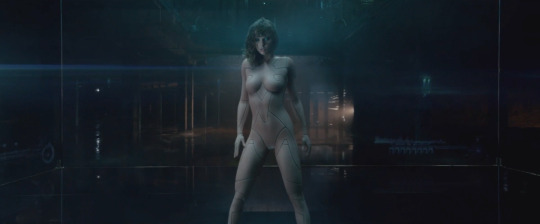
She's a shapeshifting, master-of-all-trades pop assassin, the likes of which you've never seen before. There are no rules for her. She can be savage and sexy, but guess what: the curls are back too, bitch. She's every type of Taylor, turned up to 11.
Meanwhile, Hooded Taylor plays the role of Dr. Frankenstein, inspecting her creation, putting it through the motions, each of which is a someone's version of Swift pushed to the extreme.
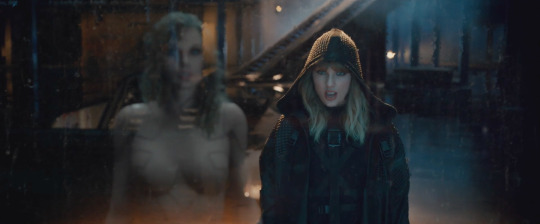
Taylor Swift was a snake? No, that's robot Medusa now.
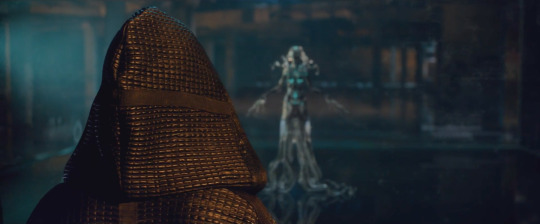
Remember the Bad Blood video? Yeah, she's got a giant lightning sword now too.
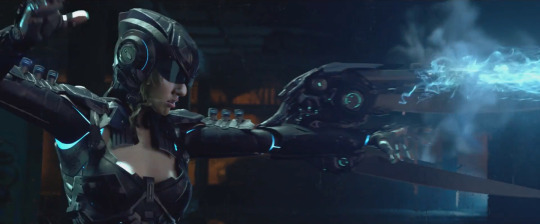
Did she ever say something about a White Horse? Well that’s HER horse now.
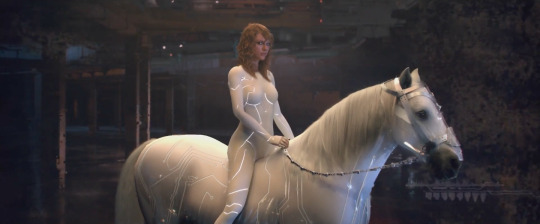
And it's ready for WAR.
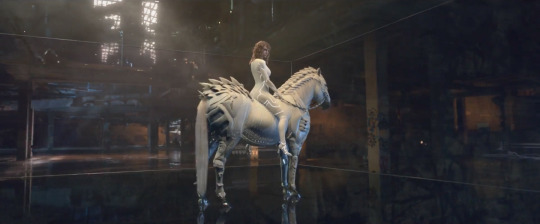
I’ll give you a moment to think of another time where we saw a bunch of different Taylors from over the years featured in the same video. More on that later.
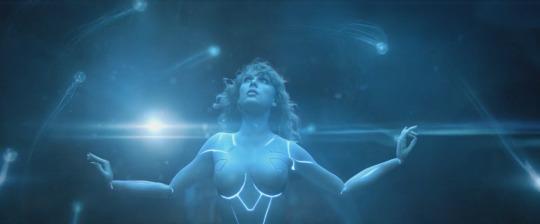
Just as her creation is showing its creative, naive, whimsical side, Dr. Swift - while obviously fascinated - prods her creation instead of encouraging it, asking that all important question: “Are you ready for it?”.
If this is going to work, then she needs to be able to deal with this. Any good Taylor Swift needs to be able to deal with being prodded at, especially when they’re in a moment of happiness.
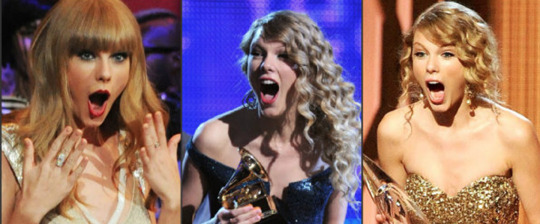
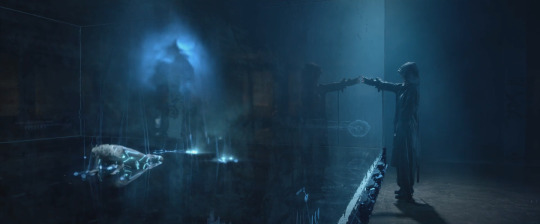
This sets off the extravagant, indulgent display of power we see next.
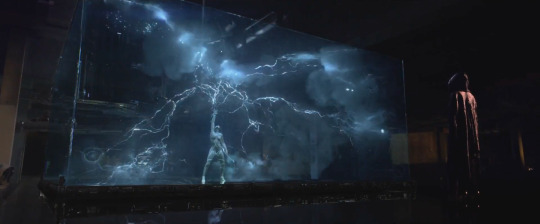
We get some really interesting moments with the lyrics here, with the video shedding a different light on the song. As Swift-via-Motoko becomes Thor-incarnate, the "let the games begin" part of the bridge starts, as Dr. Swift realises that her work is complete. She’s alive.
As the two Taylors approach each other, we get the rest of the bridge (which, as a sidenote, I think has one of Swift's most amazing harmonies, I absolutely adore this moment musically). It's here that the "touch me and you'll never be alone" line gains a new significance; it sounds a lot like Dr. Swift is warning Swift-Prime of the consequences.
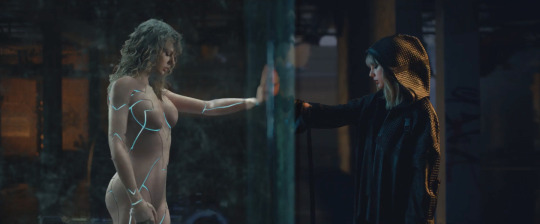
The next thing that happens is where everything starts to become clearer. Dr. Swift (aka "the old Taylor") is replaced with this new, omnipotent ultra-Swift. There's no stopping her. She will obliterate everything in her path. If 1989 was Swift's skyscraper, this is a nuclear weapon. Not even Taylor Swift herself can stand in her way, and Dr. Swift knows this; she built it, after all. She willingly sacrifices herself for the cause of reputation. Taylor Swift is dead, long live Taylor Swift.
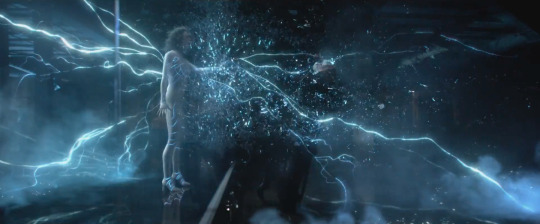
As an aside, there are more interesting lyrical bits here too, as you can read the chorus as a conversation between the two Taylors. In this context, "In the middle of the night, in my dreams/you should see the things we do, baby" reads less as a plea to a lover and more as a promise to herself, that they're going to be free from all of this one day. This works especially well if you read the subject of the song, the killer and the jailer, to be the pressures of fame rather than a particular individual (which is it's own kettle of fish, and not to say that the song isn't about a person - just an interesting perspective when tied in with the video!).
But this is also the moment when the proverbial ish hits the fan, and we get hit with the twist, as it's revealed to us that Dr. Swift IS A ROBOT TOO. WHAT IS GOING ON?!
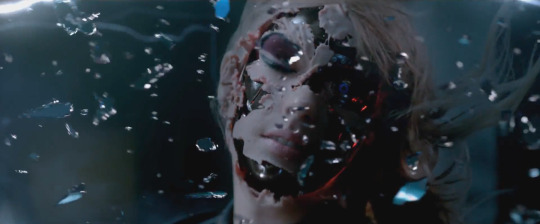
But before our minds even have time blow, as Dr. Swift's skin melts away from the sheer fierceness radiating from Swift-Prime, we can see that the other robots are being destroyed too and SOME OF THEM ARE HALF-FINISHED TAYLORS.
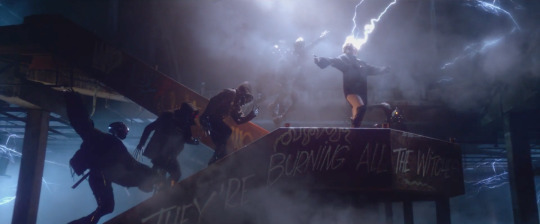
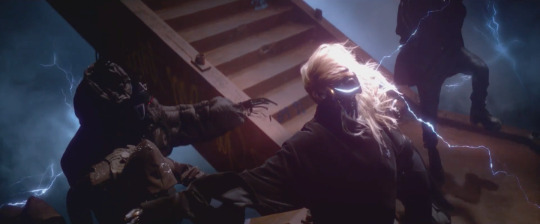
Swift-Prime stands triumphant at the end as the last Taylor standing, asking us if we're ready for her. A single tear trickles down her face; happy to be free or sad in understanding her purpose?

I’m not sure, but, while we haven't heard the rest of the album or seen any more videos, I think it's a fair assumption (read: at best a solid theory, at worst a really, really fun thought) that this is the same Taylor Swift who goes onto slay the entire universe in the LWYMMD video. So, spoiler alert: WE WEREN'T READY.
Alright, wrapping up on the gist of what happens in this video: in this world, *someone* has been building robot Taylor Swifts to take the place of the real Taylor Swift, and it took many, many iterations to get here - even to the point that the robot Taylors took over the role of creator.
That leads us to the question of "who on earth is behind all of this?" Logically, I'd say there are a couple of options presented to us. The first is "the real Taylor Swift" - who has been conspicuously absent from all of this. The idea here is that Taylor needed someone who can take it to a level of shadiness, savagery, and literally-dying-ness that people could never have imagined. Why? There could be any of number of motivations behind it, which I'm sure will become clear after the album drops. Maybe she has sacrificed her previous reputation and taken ownership of her new one in order to continue doing what she loves. Maybe she just wanted to give everyone the most powerful response possible, and badass Terminator Swift is one big middle finger to the rest of the world. Maybe she just wants to get away from it all, but wants to continue to give us music, so creates this caricature version of herself to take the heat - a Ziggy Stardust popstar messiah that gives her a hard psychological split between public and private life. There are a million different ways you can read this (and it's getting kind of too deep), but I'm not sure I quite agree with any of them.
The other possible perpetrator, and the one I lean towards, is the outside world. With Swift having shied away from the public eye, there was nobody to give her take on things. This has a number of consequences; first of which is that she didn't defend herself from the endless accusations that were thrown her way. Another is that other people will speak up and give the other side of the story - but while they may have an understanding of who Taylor Swift is, there's no replacement for actually *being Taylor Swift*. The result of that is that all of these different opinions pile on top of each other, and snowball into creating an image of Swift she had no say in. Whether photos came out of her doing charity work, or it was another article about the Kardashian-West incident, what went ignored is that "the real Taylor Swift" was just living her life and didn't engage in any of this - and she seems to be okay with that; "There will be no further explanation. There will just be reputation."
To me, that sounds a lot like her letting go of any control she might have over these mirror universe versions of herself. She removed herself from every narrative, and just kinda did the stuff that she wanted to do. All the while, Taylor Swift as a concept continued to exist and evolve in gossip columns, tweets, candids, tumblr praise essays [n.b.: again, irony, I know], internet speculation and gif collections. It makes "Look what you made me do" look less like an "Oops! I Did It Again" moment, and more of a "no, literally, you did this. LOOK."
Swift-Prime is the culmination of that. She's the critical mass of every clap and clapback. She's the ultimate, and logical, conclusion to all of this. She is reputation - the armageddon of celebrity culture. Whether she's a false prophet or the second coming probably depends on who you follow. The key thing is that she isn't real, because the real Taylor Swift can't come to the phone right now. Why? Well, we don't know. Yet, at least. Some Taylor Swifts are dead - we know that much from the RFI video - but all of the above creates another very interesting parallel to the LWYMMD video (which is genius in its own right). If we know that someone has been building all of these different Taylor Swifts, then what does that mean for this scene?

Are any of these Taylor Swifts real? Are they all man-made (or Taylor-made) robot Swifts? Is Swift-Prime in this picture somewhere? AND WHO IS ON THE WING OF THE PLANE?!
I’m sure we’ll find out, but there's a theme here, and through everything else in this era, of only being shown what someone wants to show us. The story of reputation so far is that it's a narrative about the narrative of Taylor Swift. It picks up where Blank Space left off, in that it's not actually about Taylor Swift. Put simply, LWYMMD parodies and comments on all of these different versions of Swift that are portrayed in a certain way for whatever reason, only focusing in on one singular aspect of her personality or identity, and RFI gives us an origin story of sorts for how we got there. Whoever is behind these robot-Swifts is literally building a reputation.
Now, Taylor Swift is the author of the work, so at some point she's the person pulling the strings behind all of it. But whether she's the one narrating of reputation is a completely different story. There could be a LOT going on here. Could Swift channeling Cervantes, while simultaneously casting herself as Don Quioxte. I don't wanna be the "look at me I'm referring to a classic 17th century novel" guy, but if you're familiar with Don Quioxte then you're aware that that is completely insane and awesome!
But enough of that, there's an elephant in the room.
All of this begs the question: where exactly is the real Taylor Swift? Because if any of this is anything to go by, she might not just absent from this video; we might not even have seen her this whole era. It's a question that remains unanswered no matter what stance you take - because there's certainly no real, human Taylor Swift in the RFI video. Maybe she's somewhere with an island breeze and the lights down low. Maybe she finally picked a rose garden over Madison Square. However - to bring it back to RFI as a song - maybe, just maybe, the bigger question here is, "is it really any of our business?"
While '...Ready for It' as a music video sets the scene perfectly for the world of reputation (and I hope I'm right on that and hopefully more will become clear), I've skipped over the fact that, at it's core, '...Ready For It' is a song about wanting to be left alone. It's a song about the constant pressure that fame brings along with it, and the risk of subjecting someone you love to that. Swift has always had a gift for hiding sadness in happy packages. There's no doubting that RFI is a bona fide banger, and it certainly has its fair share of funny, snarling, exciting moments. But there's a longing underscoring it, from the sheer lust in the second verse to the genuinely melancholy bridge.
At some point it just hit me that it's actually quite strikingly sad. It made me feel that, after all that, I can't really blame her for wanting to be somewhere else for a bit. To be someone else for a bit. I would too. It makes sense that, for all intents and purposes, she isn’t here.
Maybe that is where reputation comes in. I'm in no position to magically guarantee that this is going to be some high-concept album, and that this idea resonates throughout the whole thing. I could be way, way off the mark. But if I was Taylor Swift, I'd sure want to show people exactly what they made me do: kill Taylor Swift, and turn out to be pretty damn proud of it.
So on November 10, we are getting a Taylor Swift album, with Taylor Swift songs that are written and performed by Taylor Swift. Some of which might be about Taylor Swift's life. It's going to have Taylor Swift on the cover, and Taylor Swift will tour in support of it. But is this really an album about Taylor Swift? Is this an album about what we think about Taylor Swift? Or is this an album that Taylor Swift wants us to think is about Taylor Swift?
Maybe it isn't about Taylor Swift at all.
Maybe it's just reputation.
Are you ready for it?
2 notes
·
View notes